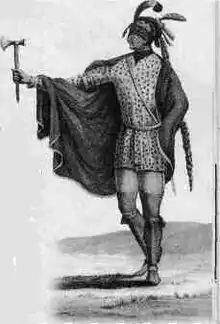Georges Henri Victor Collot
Victor Collot, in full Georges Henri Victor Collot (21 March 1750, in Châlons-sur-Marne – 15 May 1805, in Paris) was a French military officer who served in the New World in various capacities, among them as Governor of Guadeloupe.[2]
Victor Collot | |
|---|---|
 Illinois Indian of the Kaskaskia Tribe, engraving based on drawing by General Georges-Henri-Victor Collot, 1796[1] | |
| Birth name | Georges Henri Victor Collot |
| Born | March 21, 1750 Châlons-sur-Marne |
| Died | May 15, 1805 (aged 55) Paris |
| Allegiance | French |
| Other work | Author |
He is best known for his expedition down the Ohio and Mississippi rivers in the spring and summer of 1796.[2] The French ambassador to the United States, assigned him his mission.[3] French authorities believed some settlers in the region were French sympathizers. France and the United States engaged in an undeclared "quasi war", at sea, two years later.
Collot started his expedition in Philadelphia. He triggered scrutiny, right from the beginning, and was shadowed by Zebulon Pike.[2]
Pike arrested Collot, at Fort Massac, Illinois, but had to release him as there was no charges that could be laid against him.[2]
Collot traveled through very lightly settled territories.[2] France had ceded Louisiana, and all the Mississippi basin west of the Mississippi itself to Spain. Following the American Revolution the eastern branches of the Mississippi was American territory.
He made maps and observed fortifications and the country's military preparedness, almost certainly on a secret mission on behalf of the French Republic.[2] He had been watched during his progress, however, and on arriving in New Orleans he was almost immediately arrested by Carondelet, the Spanish governor, on October 27, and placed in custody at the Balize until he could be sent out of the colony on December 4. Gen. Collot published an account of this expedition under the title "Voyage dans l'Amérique Septentrionale". He also authored a "Mémoire sur les moyens de soumettre les rebelles de St. Dominique", a proposal for subjugating the rebels of San Domingo.
His account of his travels was translated into English and published in 1826.[4]
In March 2017 the Kentucky Gateway Museum Center celebrated purchasing two of Collot's maps, maps of Kentucky.[2] When describing the purchase the Kentucky Herald-Leader called Collot "an excellent mapmaker but a lousy spy."
One of the maps was “The Course of the Ohio from its Source to its Junction with the Mississippi.”[2] It was purchased from a private collector. The other map was a map of Kentucky. Most of Collot's other maps were of rivers, or riverports, while the second map purchase was of the overland route between Maysville to Lexington.
Notes
- Warren, Robert E. "Illinois Indians and French Colonists." Archived 2013-10-01 at the Wayback Machine Illinois Periodicals Online. Retrieved 14 Dec 2013.
- Tom Eblen (2017-03-19). "Kentucky invasion? Rare spy map shows French plans for frontier America". Kentucky Herald-Leader. Maysville, Kentucky. Archived from the original on 2019-10-02. Retrieved 2019-09-29.
After a four-decade search, the Kentucky Gateway Museum Center recently purchased rare original prints of two of the maps made by French Gen. Georges Henri Victor Collot, who was an excellent mapmaker but a lousy spy.
- Georges Henri Victor Collot (2014). "American Journeys: Collot Expedition of 1796". Wisconsin Historical Society. Archived from the original on 2014-03-17. Retrieved 2014-10-17.
- Georges-Henri-Victor Collot (1826). "A Journey in North America, Containing a Survey of the Countries Watered by the Mississippi, Ohio, Missouri, and Other Affluing Rivers: With Exact Observations on the Course and Soundings of These Rivers; and on the Towns, Villages, Hamlets and Farms of that Part of the New-world; Followed by Philosophical, Political, Military and Commercial Remarks and by a Projected Line of Frontiers and General Limits, Volume 1". Translated by Jens Christian Bay. O. Lange. Retrieved 2019-09-29.
External links
 Media related to George Henry Victor Collot at Wikimedia Commons
Media related to George Henry Victor Collot at Wikimedia Commons- Collot's American Expedition and his Arrest in Louisiana
- Voyage dans l'Amérique septentrionale
- John Cushman Abbott Exhibit Supplement—includes a discussion of Collot and his Voyage dans l'Amérique Septentrionale, a slide show of illustrations, and 3 downloadable pdf files of the 2-volume book plus atlas.